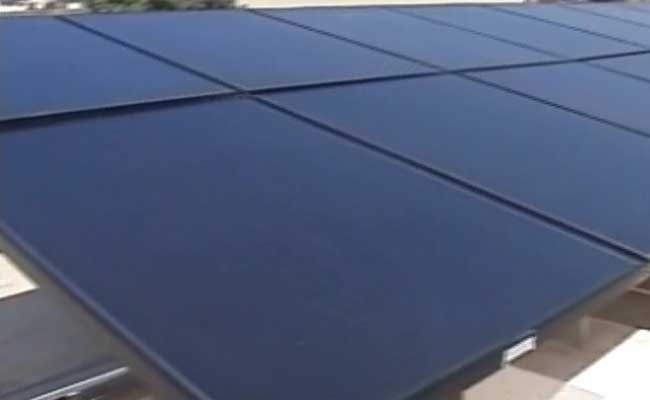The Canadian International School in Bengaluru generates its own power through solar panels
Bengaluru:
With cleaner, greener renewable energy being the need of the hour, a school in Bengaluru is setting an example. The Canadian International School is not only producing its own power and supplying the surplus to the grid, it is also giving its students important lessons on the environment. At the school, located off the Airport Road in Yelahanka, the tropical sun beats down on solar panels spread across the rooftops.
Shweta Sastri, Executive Director of the school, told NDTV that the school had turned 20 years old recently and wanted to do something for the environment and the city.
"The power we produce is more than enough for the school's needs. We are producing 5 lakh kilowatts per year. On a day like this, with peak sunlight, we produce about 300 kw per hour. We are definitely carbon neutral and on days the school is closed we are carbon positive," she said.
The solar panels cost a considerable 3 crores to install, but there are incentives given by the Karnataka state government for this - and the school is also paid for the energy it gives the grid. And, with one panel kept on the ground for students to see, this is really what education is about.
 Sean Cuxton, a student who worked on a solar project conducted by the school, said, "We have solar panels all around the campus, we can reduce greenhouse gases, because we are using power from the sun."
Sean Cuxton, a student who worked on a solar project conducted by the school, said, "We have solar panels all around the campus, we can reduce greenhouse gases, because we are using power from the sun."
Jessica of the seventh grade added, "It is just better for our environment and will stop global warming hopefully and encourage other schools to also take on this responsibility."
And it's not just solar energy that makes this school green.
There is a small biogas plant that helps teach students about the process.
Regis Caudrillier, Vice-Principal told NDTV, "We actually feed the left-over food from the cafeteria everyday - about one and a half to two kg. This goes into the plant and every day the plant produces a cubic metre of gas that goes to the stove in our cafeteria which is used for boiling vegetables and making tea and coffee."
Composting - and growing of organic vegetables - is also done on the school premises.
School Principal Shane Kells believes it is very important to teach the students this way. "A lot of the kids are coming from a fast food culture and when you are talking about composting and growing your own plants.. it takes time. And kids see the time and effort involved, and hopefully they have more respect for the people who grow the food around the world."
Shweta Sastri, Executive Director of the school, told NDTV that the school had turned 20 years old recently and wanted to do something for the environment and the city.
"The power we produce is more than enough for the school's needs. We are producing 5 lakh kilowatts per year. On a day like this, with peak sunlight, we produce about 300 kw per hour. We are definitely carbon neutral and on days the school is closed we are carbon positive," she said.
The solar panels cost a considerable 3 crores to install, but there are incentives given by the Karnataka state government for this - and the school is also paid for the energy it gives the grid. And, with one panel kept on the ground for students to see, this is really what education is about.

The solar panels cost the school Rs 3 crore
Jessica of the seventh grade added, "It is just better for our environment and will stop global warming hopefully and encourage other schools to also take on this responsibility."
And it's not just solar energy that makes this school green.
There is a small biogas plant that helps teach students about the process.
Regis Caudrillier, Vice-Principal told NDTV, "We actually feed the left-over food from the cafeteria everyday - about one and a half to two kg. This goes into the plant and every day the plant produces a cubic metre of gas that goes to the stove in our cafeteria which is used for boiling vegetables and making tea and coffee."
Composting - and growing of organic vegetables - is also done on the school premises.
School Principal Shane Kells believes it is very important to teach the students this way. "A lot of the kids are coming from a fast food culture and when you are talking about composting and growing your own plants.. it takes time. And kids see the time and effort involved, and hopefully they have more respect for the people who grow the food around the world."
Track Latest News Live on NDTV.com and get news updates from India and around the world

